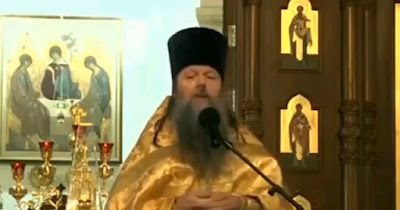Father Artemy Vladimirov, a popular Moscow-area priest, gave several interviews, epistles and other writings over the course of about twenty years while he was rector at All Saints’ Church in Moscow, which have a particular importance to an American audience. These were very kindly translated, compiled and edited by Sister Nectaria (McLees) and published by the Road to Emmaus journal as a single volume in 2010: Bright Faith.
One of the major draws of Bright Faith, at least for me, is the fact that Fr Artemy has a warm and understanding sense of humour. (Speaking of humour, Fr Artemy advises us to look at the motivation. He has little use for cynical or belittling humour, the sorts of laughter that cut others down, but he speaks very highly of self-deprecation and situational humour.) He clearly ministers to people who come from outside of Russia, and embraces them with empathy even while he also very much loves his own country. He is also, in a manner I’ve personally found to be the case with many Moscow Patriarchate priests, down-to-earth, approachable, genuine and sensible—without compromising on matters of importance to the faith. He sometimes advocates a kind of ‘tough love’ with people who aren’t sincere in their spiritual demands on him, but it’s love all the same. He also understands the temptation and pull of the ‘hyperdox’ tendency, and gently urges moderation in its place.
Fr Artemy firmly champions the traditional nature of the Orthodox faith. He cautions against the consumption of popular media, and he urges young people in particular to embrace chastity with burning zeal. However, there are times when he comes down firmly on the ‘left’ side of things. He has high words of praise, for example, for the radical anarchist priest and new martyr Saint Valentin (Sventsitskii), whom he cites as ‘one of the most interesting writers of the century’. Writing as he did during the 1990s, he laments the disappearance of government assistance programmes for the poor and the destruction of the social fabric in Russia, which accompanied the fall of communism. Even though he has very little good to say about the atheistic Soviet state or its ideologues, he still has a heart which is clearly moved by the people—widows and orphans—who were dispossessed by the ruthless cutthroat gangster capitalism which took its place.
One thing Fr Artemy is very good at in this collection of essays, is referring people to works by other authors whom he considers to be better informed and better suited to guide seekers than himself. Fr Artemy is not being falsely modest here—his perspective is informed by a historical understanding that the startsy in ages past were much more spiritually-refined than the present-day teachers, who seem to have all but disappeared. He is hopeful, however, that people who earnestly seek guidance will find it in the writings of the Russian bishops of the nineteenth century. Fr Artemy is particularly fond, it seems, of St Feofan the Recluse, Bishop of Tambov, and St Ignatii Brianchaninov, Bishop of the Caucasus and Stavropol. He recommends these bishops’ writings precisely because they are practical, and they do address questions which are applicable to the day-to-day life of new believers.
As a teacher, I was particularly gratified to note how well-attuned Fr Artemy is to the character and spiritual needs of young people. He talks about this at length in one of his essays, specifically about the spiritual life of teenagers. He strikes a very fine balance between the need for discipline (which all children do crave, at some level, for a sense of security) and the need for gentle guidance in self-motivated growth in the faith. Once again, he makes reference to St Feofan here: clearly there are some writings which I need to follow up on from this one. Fr Artemy’s Lenten reflections, as well, are of particular use and guidance to people approaching the sacrament of Confession.
This book is one I’d recommend, not necessarily to catechumens or the curious, but absolutely to new believers who are looking for a nudge in the right direction. Fr Artemy is a healthy and sane voice amid an English-language Orthodox Christian literary and social media landscape riddled with various neuroses and unhealthy fixations. Many thanks are owed to Nun Nectaria (McLees) and the folks at Road to Emmaus for making this volume available in English!
20 March 2023
Encouragement to new believers in other lands
Labels:
books,
education,
Holmgård and Beyond,
lefty stuff,
Pravoslávie,
theology,
Toryism
Subscribe to:
Post Comments (Atom)













No comments:
Post a Comment